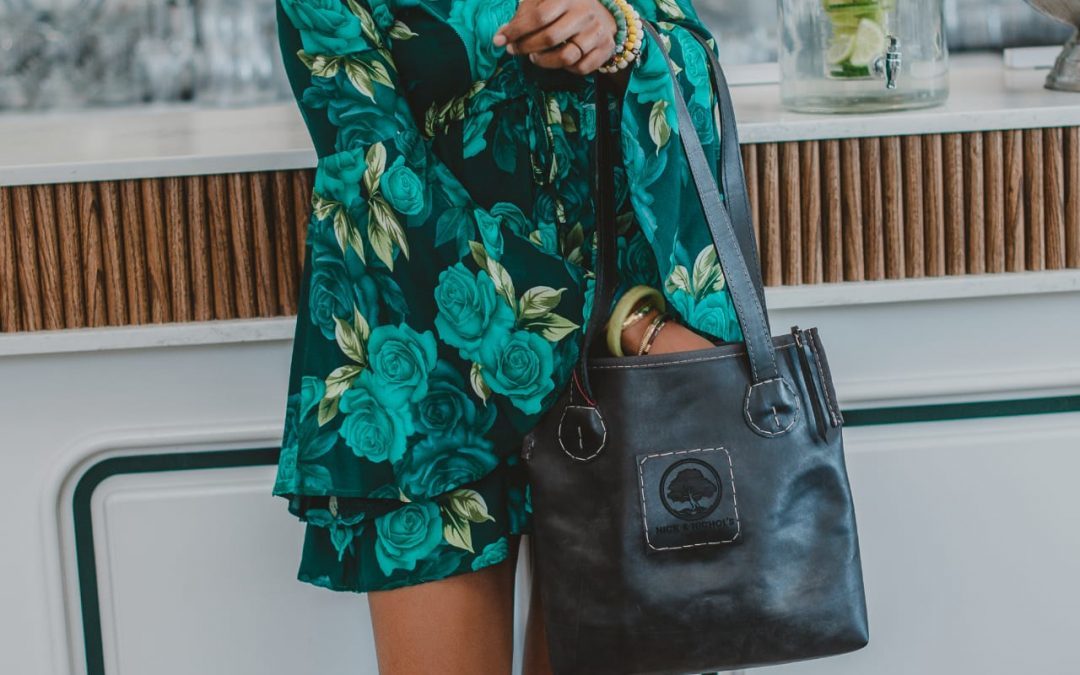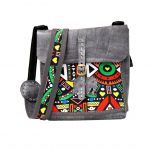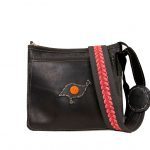Yes, really – that is what happened. From living the high life in the city, good jobs and a secure future together to boot, this young couple from Mpumalanga realised it was time to go back to their roots. Connecting with Mother Nature and the shining spirit of humanity was the inspiration for their business. Through this process they refocused their perspective to live with purpose, meaning and the authenticity of their childhoods.
Nick Nyalungu and his wife Nicole are the visionaries behind the trendy Nick & Nichols vegan leather accessories business, founded in 2016. They are cool, not because they try to be, just because they are. The same goes for their artisanal range of handmade (from car and truck tube tyre inners) upcycled products that include handbags, totes, travel bags and stationery bags amongst their inspiring range.
Most South Africans are aware of the global movement to a vegan diet, a trend that has more than quadrupled in the last five years. It is widely accepted that if the world went vegan, it could save 8 million human lives by 2050, reduce greenhouse gas emissions by two-thirds, leading to healthcare-related savings and avoid climate damages of $1.5 trillion. Perhaps less so are people aware of the direct impact vegan leather can make. Especially the vegan leather that is upcycled from disused car and truck tube inners, that would otherwise become part of the planet-destroying and ever-mounting landfill, from which Nick & Nichol’s bags are made.
According to the Higg Materials Sustainability Index, leather from cows is nearly three times as harmful to the environment as vegan leather. This argument is often misrepresented as people tend to think that just because something is made out of plastic, it automatically must be the least environmentally friendly option. However, when considering how much it takes to stop a piece of cow skin from decomposing, animal leather is right at the bottom of the sustainable materials list. Not to mention the amount of food, water and land consumption, and methane gas production by cows, as well as the harmful chemicals used in the tanning process.
“Having resigned from my job, I founded Nick & Nichol’s off the back of (almost precisely) a dollar and a dream, and with two young children in tow, it wasn’t plain sailing. I have always had an entrepreneurial spirit; my first idea was to launch an African sports brand which I tried to get off the ground through tenderpreneur routes. It didn’t work. I sulked and became increasingly frustrated until it dawned: coming into something with a selfish intent is never going to work out. I switched my motivation to one that is more altruistic, primarily focussed on raising my children, with their futures in mind. Overnight I was no longer met with resistance from the universe: the opportunities and ideas flowed,” shares the somewhat ethereal Nick.
In part, the story is this: Nic met with a childhood friend, Sizwe Khumalo, still living in the neighbourhood of their upbringing, Kabokweni, which is in the outlying areas of Nelspruit, Mpumalanga. Sizwe has a depot where he recycles tyres for Redisa (Recycling and Economic Development Initiative of South Africa). Nic noticed the stacks of by-product tyre inner tube in one corner of the depot, and this is where the idea to get creative and make bags from the tube sparked. His vision for the bags then is exactly as it is now: entirely original.
Nick bought a patching needle and waxed string; and made his first bag that night. He finished at 2 a.m. and drove immediately to Gauteng to show Nicole (who was still in the corporate world and holding the family finances together). She loved them. Armed only with faith in her husband’s idea, she too resigned from her job and they packed up their young family to pursue the idea in Mpumalanga.
“Tapping into the vegan trend was not deliberate. It happened through the lens of having to make something from nothing. I knew we were on to something, but I wasn’t quite sure yet what. We faced scepticism and naysaying from our respective families. I had to, as an independent, level-headed, mother of two, tap into strength and resilience that I was unaware of within me. The arduous journey we took to where we are now has been liberating. It has taught me that when intention comes from a place of love, to make a positive impact, it will succeed,” smiles Nicole, who has an infectious laugh and cheeky sense of humour.
The second part of the story is about triumph in the face of hardship. The Nyalungu family literally went from wearing Tag Heuer watches to using long drop toilets overnight. They moved in with a family they didn’t know who kindly offered them (all four of them) a single room, in their already small home in Bushbuckridge, near Hazyview, Mpumalanga. The family’s experience of the time in Bushbuckridge is a testament to it being a community that upholds family values and the spirit of ubuntu.
“We began to tap into the broader community and met Ethnie Cameron, a White River local, who liked our idea. We knew nothing about making bags and she linked us to Trevor Selke, owner of Selke Bags. Trevor mentored us, offered the use of his factory for us and shared his list of suppliers. We knew what we needed to get to go it alone, but couldn’t afford the equipment. Andrew Mashile, who owns Leather Works, a leather business in Bushbuckridge, offered the use of his factory and taught us to further hone our skills, for which are eternally grateful – at the time, we wanted Andrew to join our business too,” reflects Nick.
Fast forward a bumpy road and three years later: today, through the generous help of family, friends, locals and even tourists whom they met along the way, Nick & Nichol’s has the necessary equipment and a very snazzy shop at the Casterbridge Lifestyle Centre in White River!
follow: www.facebook.com/rubbertubebags
Newsletter Sign Up





